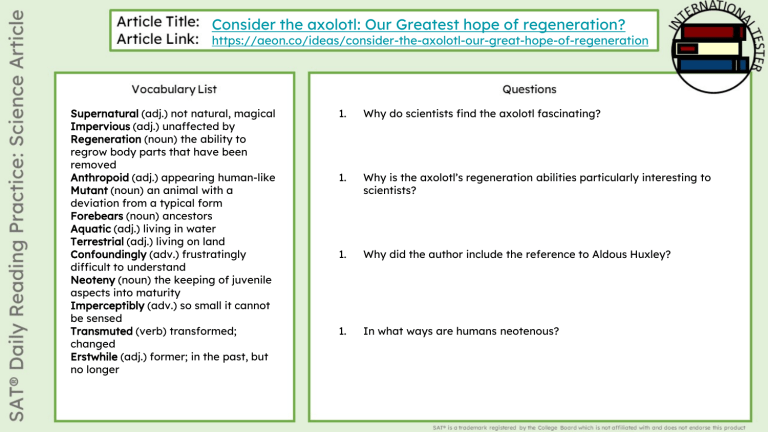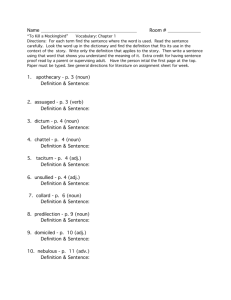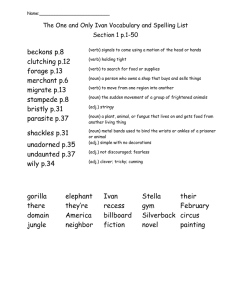
Consider the axolotl: Our Greatest hope of regeneration? https://aeon.co/ideas/consider-the-axolotl-our-great-hope-of-regeneration Supernatural (adj.) not natural, magical Impervious (adj.) unaffected by Regeneration (noun) the ability to regrow body parts that have been removed Anthropoid (adj.) appearing human-like Mutant (noun) an animal with a deviation from a typical form Forebears (noun) ancestors Aquatic (adj.) living in water Terrestrial (adj.) living on land Confoundingly (adv.) frustratingly difficult to understand Neoteny (noun) the keeping of juvenile aspects into maturity Imperceptibly (adv.) so small it cannot be sensed Transmuted (verb) transformed; changed Erstwhile (adj.) former; in the past, but no longer 1. Why do scientists find the axolotl fascinating? 1. Why is the axolotl’s regeneration abilities particularly interesting to scientists? 1. Why did the author include the reference to Aldous Huxley? 1. In what ways are humans neotenous? Quantum Mechanics, the Chinese Room Experiment & the Limits of Understanding https://www.scientificamerican.com/article/quantum-mechanics-the-chinese-room-experimentand-the-limits-of-understanding/ Implications (noun) consequences or results and meanings Cognition (noun) the ability to think Lofty (adj.) highly abstract or complex Cocky (adj.) overly arrogant Mimics (verb) imitates Begging the Question (idiom) when a claim is supported by its own premise Solipsism (noun) a theory that we can only know ourselves to be truly conscious (maybe everyone else is a robot) Cognitive dissonance (noun) holding two conflicting ideas in the mind at the same time Intelligible (adj.) understandable Slammed (verb) criticized harshly Ubiquity (noun) a fact or idea being common or appearing everywhere Rote (noun) mechanical or habitual repetition of an idea 1. What is the “Turing test”? 2. What is the difference between thinking and consciousness according to some scientists? 3. What is the Chinese Room experiment? 4. Does the author of the article find the Chinese Room experiment convincing? 5. What can you infer about the author of the article? The Woman who challenged Darwin’s sexism https://www.smithsonianmag.com/science-nature/woman-who-tried-take-down-darwin-180967146/ Critique (noun) a detailed analysis and assessment of a work of literature or art Default (noun) the preselected option in language that makes certain idea automatic (ex. doctor=man) Oversight (noun) a minor mistake made by not thinking carefully Realm (noun) area of knowledge or ability Eminent (adj.) important and famous Coined (verb) created Postulating (verb) suggesting; indicating Penning (verb) witing Reconciled (verb) made two contrasting ideas make sense together Effusive (adj.) unrestrained in expressing strong feelings Equilibrium (noun) a state of balance Dismantle (verb) to take apart; to disassemble Proscription (noun) a limitation that bans or forbids 1. According to the author, how did Blackwell respond to being addressed as “Sir”? 1. What is the main idea of Darwin’s The Descent of Man? 1. What concession did Blackwell have to make in order to remain in the Theology department of the university? 1. In what ways were Darwin’s theories sexist according to Blackwell? The Children’s Era by Margaret Sanger (1925) https://www.americanrhetoric.com/speeches/margaretsangerchildrensera.html Philanthropy (noun) the donation of large sums of money to a charity or cause Refugee (noun) a person who has been forced to flee his/her homeland because of war, famine, poverty or some other oppression Asylum (noun) a hospital for the mentally ill Filth (noun) dirt and things that cause disease Infantile Mortality (noun) the rate at which children die before reaching maturity Foredoomed (adj.) destined for a bad result before anything is started Feeble-minded (adj.) having an inability to think clearly; mentally disabled Unfit (noun) people who cannot function is society because pf physical or mental disabilities Sanction (noun) restriction Emancipation (noun) freedom 1. What analogy does Sanger use to address the idea of making things better for children? 1. What does Sanger think of child labor? 1. According to Sanger what conditions affect the health of a growing baby? 1. What is Sanger’s main idea? 1. What conditions should prevent people from becoming parents according to Sanger? The Ones who walk away from Omelas by Ursula K. LeGuin http://harelbarzilai.org/words/omelas.txt Clamor (noun) noise Procession (noun) a line of people walking like in a parade Decorous (adj.) restrained and polite Grave (adj.) serious Restive (adj.) unable to stay still; restless Stallion (noun) male horse Pedant (noun) a person who is excessively concerned about minor details or rules Goody-Goody (idiom) repulsively sweet and nice Languor (noun) a feeling of laziness Mounted (verb) climbed on top of something as if to ride it (like a horse) Pace (noun) the length of a person’s step Festered (adj.) rotten due to infection Impotence (noun) inability to take action Imbecile (noun) an old-fashioned term for someone with a mental disability Sniveling (verb) crying and sniffing in a hopeless manner 1. What is the main contrast in the story? 1. What do the citizens have to allow in order for their happiness to continue? 1. What can you infer about those who leave Omelas? 1. There is a reference to “Drooze” in the story which is a drug. Why might people who are happy take a drug? Consider the Axolotl 1. 2. 3. 4. These animals can regenerate their body parts without scarring, appears to stop maturing while being sexually mature, and has the most complex genome sequence ever sequenced. If we can understand how regeneration happens on such a large scale, humans could regrow amputated limbs, damaged organs and spines. Huxley wrote science fiction and the axolotl seems more like an animal from a science fiction story than a real one. We remain mostly hairless with flat faces and small noses (compared to other animals). Quantum Mechanics: the Chinese Room Experiment… 1. 2. 3. 4. 5. It is a test that is used to determine whether a computer is thinking independently of its programming. It involves examining answers produced by a computer and those produced by a human and if a computer’s answers are indistinguishable from a human’s the computer has passed the test. Thinking is a mechanical process but consciousness is a higher level of awareness. Some scientists consider them the same and others do not. It is a thought experiment that tries to show how computers could have consciousness but not express themselves as clearly as we would expect because of a “language barrier”. A man with no knowledge of Chinese could respond to simple questions with the help of a dictionary, and those answers may not be perfect, but he still is conscious. No, the author says that it is founded on the faulty logic of begging the question. He has a minimal background in mathematics but is interested in physics. The Woman who challenged Darwin’s Sexism 1. 2. 3. 4. Blackwell did not forget the assumption that anyone who was intelligent and educated must be a man. Men are naturally superior to women She could do the work, but could not receive a degree and thus become an ordained minister. Darwin ignored the contributions of the females of the species and disregarded their unique characteristics. The Children’s Era 1. 2. 3. 4. 5. She makes the analogy of a garden and children are the crops being grown. Society’s garden has not been well tended to grow healthy children. She considers it an evil act. Worry, strain, shock, unhappiness, enforced maternity (forced to carry a pregnancy) We must fight for the health and happiness of unborn children by providing a safe, happy and healthy environment for the mothers and examinations for people to become parents. (yes she is a little extreme in her views) The numbered list in the article including transmissible disease, temporary disease, subnormal children already born in the family, births happening too close together, parents younger than 23 years old, poverty, parents who are fighting The Ones who walk away from Omelas 1. 2. 3. 4. The main contrast is between the joy and beauty of Omelas with the misery of the child in the cellar room They have to allow the misery of a single child. They are unable/unwilling to allow someone to suffer so that they can be happy People are often unhappy while in happy circumstances. Wealth, beauty, talent, privilege are all things people believe will make them happy, but still famous people who appear to have everything commit suicide. So there must be something else that is required to attain happiness...or maybe happiness is not possible all of the time. For more reading help visit www.internationaltester.com Or connect with me through the links below by Email, Facebook, Instagram, Pinterest or Linkedin






